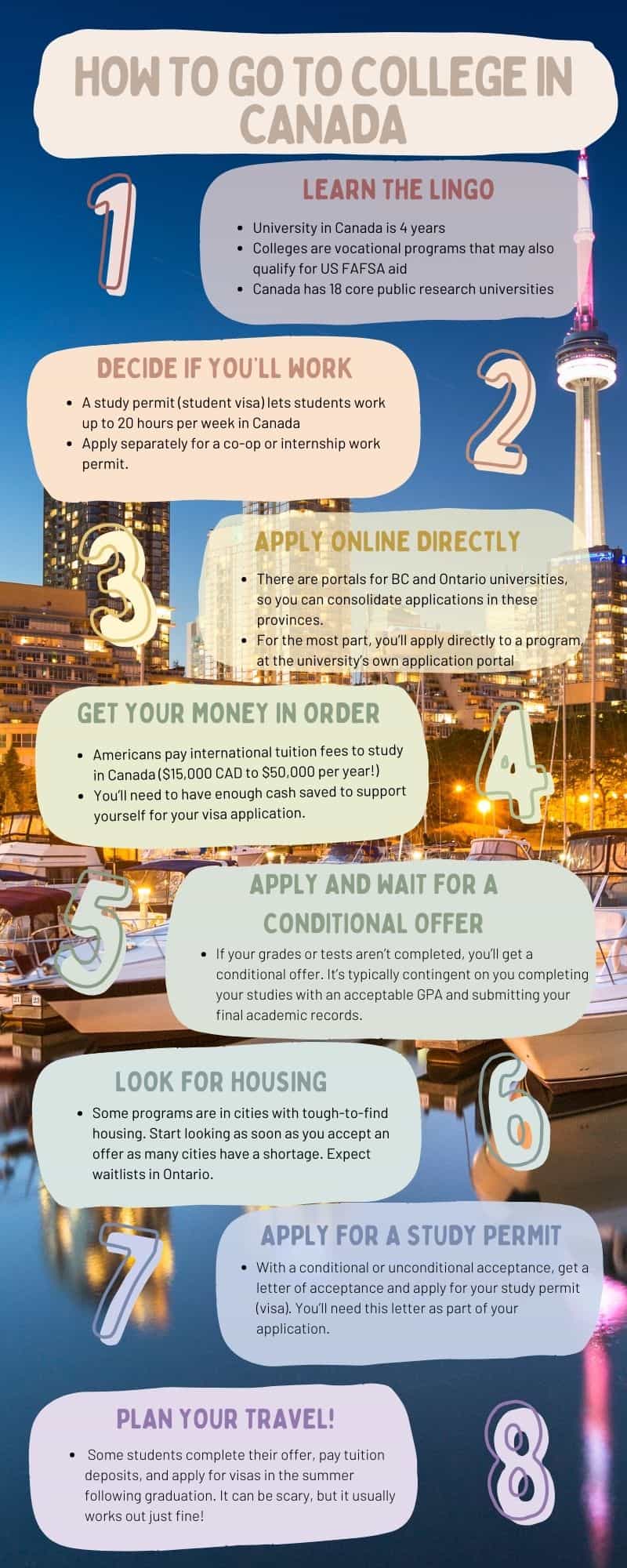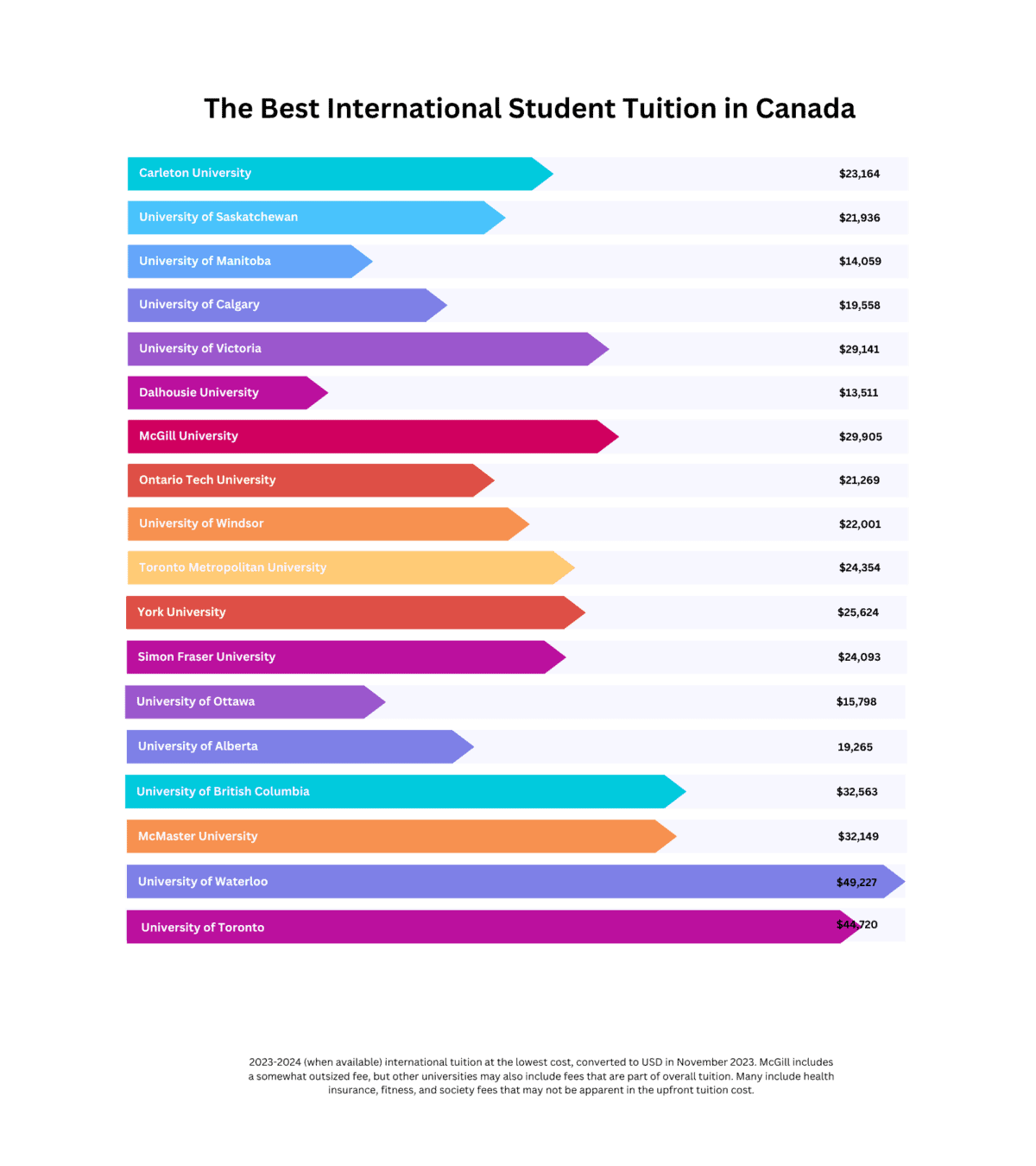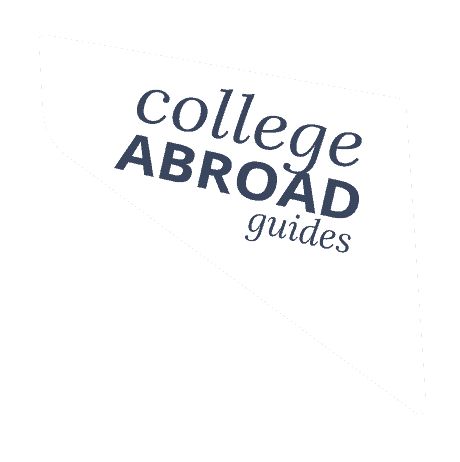What can you do about that?
- Consider Provinces with Lower Tuition Costs: Some Canadian provinces, like Quebec, Newfoundland and Labrador, and Manitoba, typically have lower tuition fees compared to other provinces. However, keep in mind that living costs can vary across provinces.
- Budget for Living Expenses: Besides tuition, consider the cost of living in different cities and regions of Canada. Some cities have higher living costs than others. Budgeting and choosing a location with lower living costs can make a significant difference.
- Look for Scholarships and Financial Aid: Many Canadian universities offer scholarships and bursaries that are available to international students, including Americans. These can significantly reduce the cost of tuition. Research and apply for scholarships offered by the universities themselves as well as external organizations.
- Explore Work Opportunities: International students in Canada are allowed to work part-time during their studies (up to 20 hours per week during academic sessions and full-time during scheduled breaks). This can help offset living expenses.
- Consider Exchange Programs: Don’t give up! If you enroll in a U.S. or other university, look into exchange programs with Canadian universities. These programs can sometimes allow you to pay your home institution’s tuition rates while studying in Canada.
Is College Free in Canada?
Nope, university isn’t even free for Canadians, though costs are much lower than they are for international students.
On average, international students can pay two to four times more than Canadian students for undergraduate programs. For Canadian students, the average annual tuition might range from $6,000 CAD to $10,000 CAD, depending on the program and province.
In contrast, international students often face the lowest institutional tuition fees (in fields that rely on library resources like humanities and social sciences) ranging from roughly $16,000 USD (University of Ottawa) to $50,000 USD per year (University of Waterloo), with some programs (like medicine and engineering) potentially costing even more.
Is University Cheaper in Canada or the USA?
University is often cheaper in Canada, but that doesn’t mean it will be cheaper for you in Canada. Students with running start credits, in-state tuition, and a crash pad at mom and dad’s can spend much less in the United States than they might in Canada. But not all students have these advantages. Further, the cost of living in Canada is high and university lasts 4 years, just like in the US.
How Much Bank Balance is Required for a Student Visa in Canada?
Students need to prove they can:
- Pay their first-year tuition. The exact amount will depend on your program and university.
- Prove that you have the funds to pay your living expenses for a year in Canada: that’s currently $10,000 CAD outside Québec and $13,134 in Québec.
- Prove you can support any family members you bring into Canada with you. Amounts vary depending on your number of dependents and whether you’re heading to Québec or elsewhere.
Can I use Financial Aid to Go to University in Canada?
That’s a yes.
While the US FAFSA program doesn’t cover every single institution of higher education in Canada, it does cover the major universities, including the University of Toronto, Simon Fraser, McGill, McMaster, and Dalhousie. The only “big name” 4-year school where US Federal aid isn’t available is the University of Saskatchewan.
Many more are eligible for deferment only (if you have other student loans). Here’s a complete list.
When Does University Start in Canada?
Canadian universities. most often operate on a semester schedule: classes start in September, take a break for the winter holidays, and resume for spring semester until May.
Here’s an example: at the University of Toronto in 2023, classes for fall semester begin Sept. 7, after Labor Day (it feels just like the US, but they spell it with a U). There are no classes for Thanksgiving on October 9 (I know, right? But harvest happens before the snow flies up north).
Classes end for many courses on December 6, and finals week comes after.
Winter semester classes start the first week of January. Classes end on April 5, with finals week following.
Summer classes are more flexible, and your program of study may or may not depend on them.
Like in the US, not all courses are offered in the summer, but summer terms can be a great way to pick up coursework you couldn’t fit into your schedule in previous semesters. Summer term classes start in May with sessions in May/June and July/August.
How Do I Apply to Study in Canada?
While most provinces invite students to apply for admission on their websites, Ontario has its own application portal. So if you want to study in Ontario, you can apply using this clearinghouse: OUAC (O-U-Ack) as a “105 student” (non-Ontario resident or international student).
Select your programs in November.
A few competitive universities, like the University of Toronto, McMaster, the University of British Columbia, and McGill close admissions first, typically around January 15, so you need to apply by then. Many other universities follow soon after, so this is a good benchmark for completing all applications.
All universities will have their own portals for applicants, too. So once you apply on a portal, you’ll log onto individual portals to see if you’re missing anything, and what the status of your application is.
In British Columbia, you can also apply via EducationalPlannerBC, which allows applicants to apply to Canadian institutions of higher learning across British Columbia.
University websites typically show prospective students last year’s cutoff rates for the grades you post on your high school diploma, as well as test scores like SATs, so you have an idea about whether you’re a competitive candidate. However, the majority of universities post averages for accepted students. You won’t know if you meet admission requirements, but you’ll get a sense of where the cutoffs have historically been.
With a “3 rounds of admissions” system to university programs, Canadian universities invite applicants to submit their grade 11, and then grade 12 midterm marks. Offers are extended on a particular day in three rounds: round one offers come out in February (where your grade 11 marks count), round 2 in April (where your grade 12 report card marks become important), and round 3 (where even more grade 12 marks are considered, at least for Canadian students).
Most offers are given and accepted in May.
They’ll need to make a decision in early June.
Many highly competitive and top universities consider all marks late in Canadian students’ 12th-grade year: these universities extend letters of acceptance once, on a single day.
Some competitive and arts programs require a supplemental application: it’s usually a personal statement or essay question. Deadlines for that material can be anywhere between January and March. To be eligible for university admission at these schools, you’ll need to submit all required materials. University portals can help you check for deadlines and missing information.
Is it free to apply to a school in Canada?
No. For 2024, you’ll pay at least $150 CAD plus a $10 CAD international fee to apply via OUAC. However, program applications cost $50 CAD apiece, so the more you apply for, the more your total will be.
What GPA do I Need to Come to Canada?
Grab a university viewbooks for your dream institution to see the specific grades you’ll need for every program at every university. They’re gold.
They can show you the basics for specific programs at every post-secondary school in Canada, along with the requirements for all the programs offered — but the admission requirements are aimed at Canadian students.
US students find it tough to translate Canadian requirements (“low to mid-80s,” for example) into US GPAs.



























